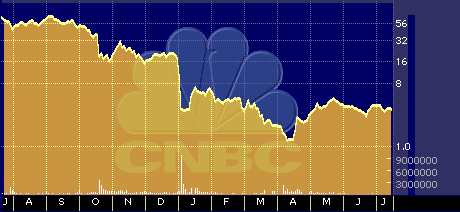
Potholes on the Information Highway
Potholes on the Information Highway
by Hal Plotkin
Silicon Valley Correspondent
The stock of tiny Tumbleweed Communications Co. {TMWD}, a provider of secure online-communications services to the United States Postal Service, among others, has jumped about 50 percent since the company’s early-August IPO.
“Tumbleweed is extremely well-positioned to exploit growth in online technology,” says Todd Raker, an equity analyst at Credit Suisse First Boston in New York.
Raker says Tumbleweed’s stock might be trading even higher were it not for widespread ignorance about the company and the recent spate of skepticism toward Internet IPOs. “Tumbleweed has a very good story to tell, outstanding customers, and a clear lead in technology,” he says. The stock traded at a recent $14.81.

TMWD post-IPO stock price chart
Tumbleweed, an 80-person company based in Redwood City, Calif., sells technology that allows businesses and consumers to transmit secure communications over the Internet. Tumbleweed’s software prevents online messages and documents from being intercepted, read, or tampered with en route; verifies the identity of both the sender and receiver; and creates an audit trail.
Users of Tumbleweed’s technology are notified by e-mail that a secure document is waiting for them. The correspondent uses a Web browser to visit a Web site designated in the e-mail to view and download the document in a secure environment. The use of digital certificates adds another level of security by verifying that a person using a password is in fact the owner of the password.
“[Tumbleweed’s] process substantially increases the level of security,” says Matt Cain, an analyst at Meta Group in Stamford, Conn.
Tumbleweed is also expected to benefit from its alliance with Palo Alto, Calif.-based Kana Communications Inc., a leading seller of automated e-mail response systems. “Absolutely, that’s a big help,” Cain says. “You’re going to see more and more outbound marketing and e-mail based transactions, so putting those things [inbound e-mail processing and secure outbound online responses] together is a natural move,” he says.
“[The company has] an ideal solution for many types of online transactions,” says Steve Robbins of Yankee Group, based in Boston. “You know immediately that someone saw your document, and you might even be able to get them to take some kind of action on your Web site right away as a result.”
Tumbleweed and Menlo Park, Calif.-based rival docSpace Inc. are currently involved in a patent dispute. A lawsuit initiated by Tumbleweed last March charges docSpace with violating Tumbleweed’s patent. In May, docSpace’s attempt to vacate the lawsuit was continued pending further legal proceedings.
“I don’t think Tumbleweed can lose from a legal perspective,” Raker says. He says Tumbleweed’s success pulling in big-name clients, which include the U.S., French, and Canadian Postal Services, are evidence of the company’s superior technology. In July, another early Tumbleweed customer, United Parcel Service Inc., invested $4 million in the company.
“[All these companies] evaluated the competition before signing on, using the most stringent security audits,” Raker says. “When you look at the customer lists [of the different companies], they don’t compare. Tumbleweed clearly has the best solution in the market.”
For its part, docSpace has a marketing alliance with Verisign Inc. {VRSN}, the Mountain View, Calif.-based company that claims to be the leader in Internet-based trust services. Verisign’s customers include BankAmerica Corp. {BAC}, Dow Jones {DJ}, and AT&T {T}, among others.

VRSN 52-week stock price chart
Like Raker and Robbins, Cain says the legal fight between Tumbleweed and docSpace is far less important than the battle in the marketplace. “We have only scratched the surface of this nascent market, which is going to explode. There’s plenty of room for competition,” he says.
Other Tumbleweed competitors include Cupertino, Calif.-based PostX Corp., and NetDox Inc. of Deerfield, Ill. Despite all the competition, industry analysts say Tumbleweed’s impressive customer roster makes it unlikely that the company will be easily blown away.
Tumbleweed posted a net loss of $5.9 million for 1998, on slightly more than $2 million in revenue. Company executives say they expect losses to continue “for the foreseeable future,” according to SEC filings.


